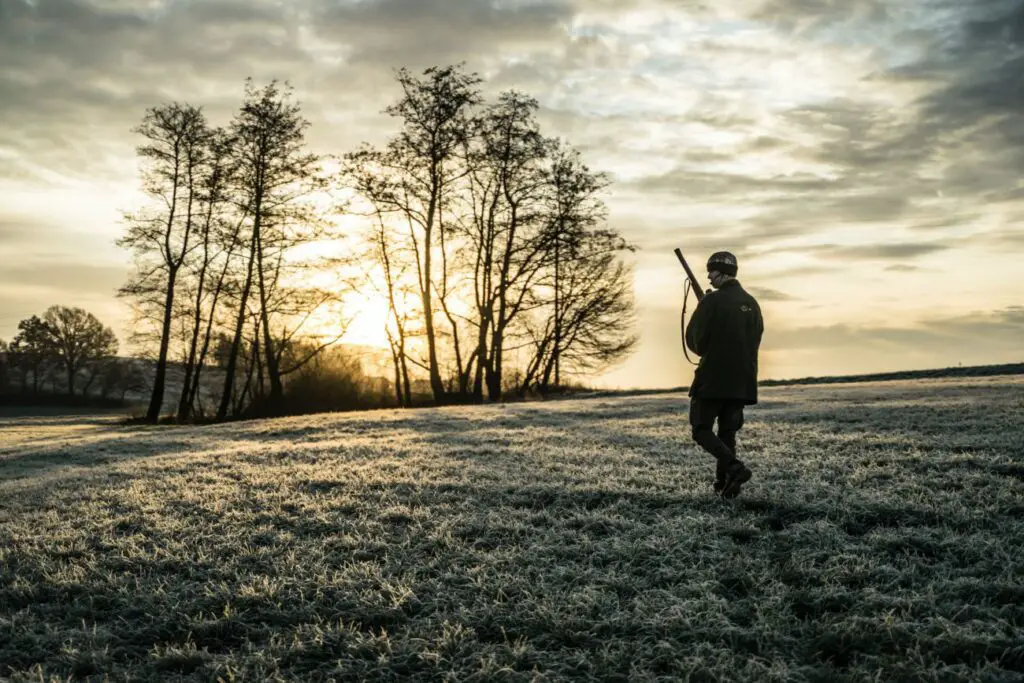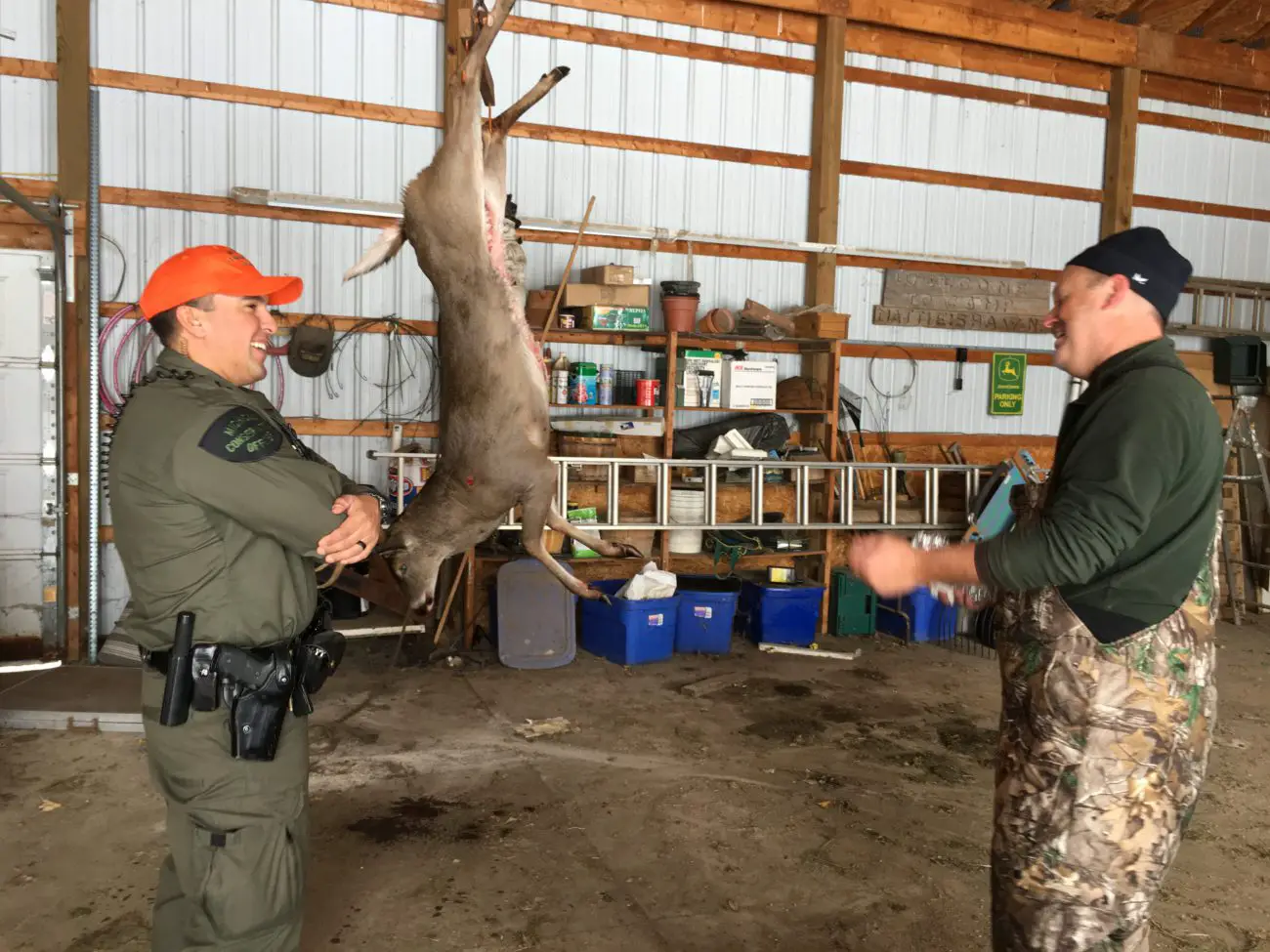As Michigan Department of Natural Resources conservation officers gears up for the 2020 firearm deer season, they expect that this year’s higher hunting license sales will mean more new and experienced hunters in the woods. Here’s a list of the 10 most common hunting violations that conservation officers encounter every firearm season – most of which easily can be avoided with a little research and planning.
#1 – Using the wrong tag or improperly filling out a tag
Conservation officers often see the wrong kill tag on the game – such as fish or turkey licenses on a deer. Often, this is a simple mistake made in the dark and can easily be corrected by re-tagging the deer as soon as you notice the error.
Solution: Before field-dressing or moving the deer, kill tags should be filled out (including the month and date the deer was taken and the deer’s gender and a number of antler points) and properly placed on the deer.
#2 – Not wearing orange
Some hunters remove their orange clothing once they get into deer stands or blinds. In the excitement of getting a deer, hunters may forget to put their orange clothing back on.
Solution: Commit to wearing hunter orange to keep yourself and others safe. Hunters are required by law to wear hunter orange as the outermost layer of clothing at all times. The DNR recommends wearing as much hunter orange as possible to increase visibility to other hunters. Orange and other bright colors do not affect a deer’s behavior. Hunter orange garments, including camouflage, must be at least 50 percent hunter orange and be visible from all directions. Clothing options include a cap, hat, vest, jacket, or raincoat.
#3 – Being unfamiliar with a firearm and how it functions
Semi-automatic, lever, bolt and pump-action firearms are common choices among hunters, but each firearm functions very differently.
Solution: Take the time to familiarize yourself with your firearm and make sure it is properly sighted and functioning before you go hunting. Being able to safely handle your firearm is an important part of being a responsible hunter.
#4 – Committing safety zone violations
Each year conservation officers investigate property damage caused by firearms.
Solution: Rifle rounds travel long distances – hunters are responsible for where their bullets end up. Know the area you’ll be hunting, including nearby buildings and properties. No one may hunt with a firearm within 450 feet of an occupied structure (including buildings, dwellings, homes, residences, cabins, barns, or structures used for farm operations) unless they have permission from the landowner.
#5 – Trespassing
If a deer runs onto private property, the hunter cannot retrieve it without the landowner’s permission. Conservation officers are usually contacted when trespass disagreements escalate and a resolution cannot be reached.
Solution: Respect landowner rights and posted trespassing signs. If you’ll be hunting near someone else’s property, contact the landowner ahead of time; don’t wait until you’re tracking game. Most of the time, a friendly call or visit to your neighbor will remedy the situation.
#6 – Staking claims to public land hunting blinds

Confrontations over hunting spots, or the illegal posting (trespassing or hunting signs) of state-managed public land, happen every year. Conservation officers are asked to help resolve such disputes and say the main reason for these situations is usually last-minute hunters who randomly pick a spot.
Solution: Hunters should research and scout the land they plan to hunt – before hunting day. Brush, constructed blinds, and tree stands on public land are just that – public. Regardless of who constructed, purchased, or tends to these blinds, they are available on a first-come, first-served basis when they’re on state-managed public land. Public land cannot be posted or reserved.
Tree stands used on public land must be portable and have the hunter’s name, address, and Michigan driver’s license number or DNR sportscard number affixed in legible English that can easily be read from the ground. Hunting platforms cannot be affixed or attached to any tree by nails, screws, or bolts.
Refer to page 24 of the Hunting Digest for more information about hunting from tree stands on public property.
#7 – Littering
Leaving propane bottles, hand warmer wrappers, food wrappers, bottles, and other trash causes problems for animals and people.
Solution: Practice the “leave no trace” ethic. Whatever is brought into the woods should be taken back out. It is the responsibility of all hunters to be environmental stewards and clean up after themselves.
#8 – Baiting/attracting deer
Conservation officers stay busy responding to calls about illegal baiting in Michigan’s Lower Peninsula and portions of the Upper Peninsula.
Solution: Know the law. Baiting and feeding are banned in the entire Lower Peninsula and portions of the Upper Peninsula – except for hunters with disabilities who meet specific requirements.
In approved Upper Peninsula baiting areas, 2 gallons of bait can be spread in an area that measures 10 feet by 10 feet. The bait must be brought in each night on commercial forest land unless the landowner has given permission. Use bait sparingly to help curb the spread of deer diseases like bovine tuberculosis and chronic wasting disease.
#9 – Hunting out of hours or off-season
One of the most common complaints to the DNR’s Report All Poaching Hotline is about shots fired after dark. Often, these complaints are reported days later.
Solution: A hunter may legally shoot game 30 minutes before sunrise or until 30 minutes after sunset. Anyone who witnesses or suspects hunting outside of legal hours should immediately call or text the DNR’s Report All Poaching hotline at 800-292-7800. Fast reporting makes it more likely that a conservation officer will identify the suspect.
#10 – Harassing hunters
Conservation officers investigate acts of hunter harassment when a person or organization intentionally sabotages another hunter’s quality opportunity to take the game. Examples include spraying repellent around a hunter’s blind, creating loud noises and/or barriers that prevent or deter a hunter or game from accessing an area or destroying other hunters’ equipment such as trail cameras and blinds.
Solution: Respect the law. Michigan law prohibits anyone obstructing or interfering with the lawful taking of animals. Hunter harassment is a misdemeanor offense.
Anyone who feels targeted by hunter harassment or witnesses a natural resource violation should immediately call or text the Report All Poaching Hotline line at 800-292-7800. Information can be left anonymously; monetary rewards may be offered for information that leads to violators’ arrest and conviction.
Hunter’s education teaches hunters about safe, ethical hunting practices. A valid hunter safety certificate is required to purchase a hunting license in Michigan. Complete hunter education online at Michigan.gov/HunterEducation.
Michigan conservation officers have fully commissioned state peace officers who provide natural resources protection, ensure recreational safety, and protect citizens through general law enforcement and conducting lifesaving operations in the communities they serve. Learn more at Michigan.gov/ConservationOfficers.
Cover Photo: Conservation Officer Richard Cardenas listens to a successful hunter explain how he legally took his deer on the opening day of the 2019 firearm season in Barry County, Michigan




